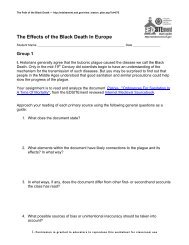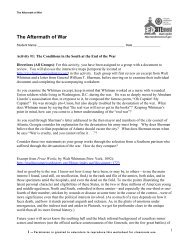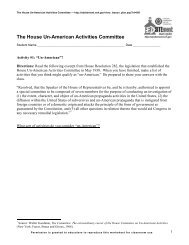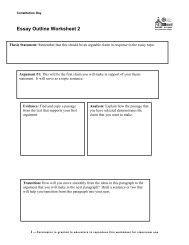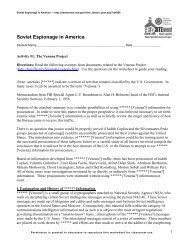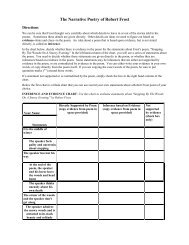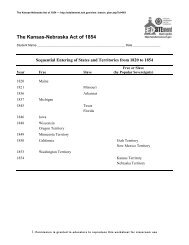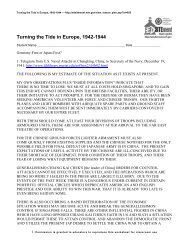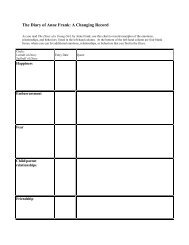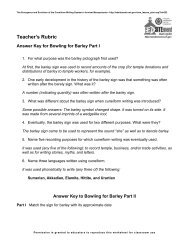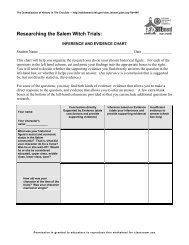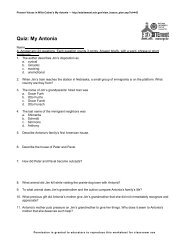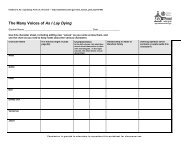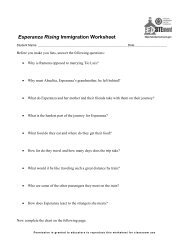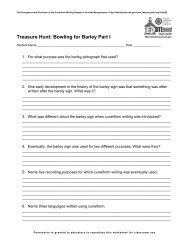Abraham Lincoln, the 1860 Election - EDSITEment
Abraham Lincoln, the 1860 Election - EDSITEment
Abraham Lincoln, the 1860 Election - EDSITEment
You also want an ePaper? Increase the reach of your titles
YUMPU automatically turns print PDFs into web optimized ePapers that Google loves.
<strong>Abraham</strong> <strong>Lincoln</strong>, <strong>the</strong> <strong>1860</strong> <strong>Election</strong>, and <strong>the</strong> Future of American Slavery — http://edsitement.neh.gov/view_lesson_plan.asp?id=662<br />
Frederick Douglass, “The Constitution of <strong>the</strong> United States: Is it Pro-Slavery or Anti-Slavery?”<br />
(March 26, <strong>1860</strong>):<br />
The way to abolish slavery in America is to vote such men into power, as will use <strong>the</strong>ir powers for <strong>the</strong><br />
abolition of slavery. . . .<br />
My argument against <strong>the</strong> dissolution of <strong>the</strong> American Union is this: It would place <strong>the</strong> slave system<br />
more exclusively under <strong>the</strong> control of <strong>the</strong> slave-holding States, and withdraw it from <strong>the</strong> power in <strong>the</strong><br />
Nor<strong>the</strong>rn States which is opposed to slavery. Slavery is essentially barbarous in its character. It, above<br />
all things else, dreads <strong>the</strong> presence of an advanced civilization. It flourishes best where it meets no<br />
reproving frowns, and hears no condemning voices. While in <strong>the</strong> Union it will meet with both. Its hope<br />
of life in <strong>the</strong> last resort is to get out of <strong>the</strong> Union. I am, <strong>the</strong>refore, for drawing <strong>the</strong> bond of <strong>the</strong> Union<br />
more closely, and bringing <strong>the</strong> slave States more completely under <strong>the</strong> power of <strong>the</strong> free States. What<br />
<strong>the</strong>y most dread, that I most desire. I have much confidence in <strong>the</strong> instincts of <strong>the</strong> slave-holders. They<br />
see that <strong>the</strong> Constitution will afford slavery no protection, when it shall cease to be administered by<br />
slave-holders. They see, moreover, that if <strong>the</strong>re is once a will in <strong>the</strong> people of America to abolish<br />
slavery, <strong>the</strong>re is no word, no syllable in <strong>the</strong> Constitution to forbid that result. They see that <strong>the</strong><br />
Constitution has not saved slavery in Rhode Island, in Connecticut, in New York, or Pennsylvania; that<br />
<strong>the</strong> free States have increased from one up to eighteen in number, while <strong>the</strong> slave States have only added<br />
three to <strong>the</strong>ir original number. There were twelve slave States at <strong>the</strong> beginning of <strong>the</strong> Government: <strong>the</strong>re<br />
are fifteen now. There was one free State at <strong>the</strong> beginning of <strong>the</strong> Government: <strong>the</strong>re are eighteen now.<br />
The dissolution of <strong>the</strong> Union would not give <strong>the</strong> North a single advantage over slavery, but would take<br />
from it many. Within <strong>the</strong> Union we have a firm basis of opposition to slavery. It is opposed to all <strong>the</strong><br />
great objects of <strong>the</strong> Constitution. The dissolution of <strong>the</strong> Union is not only an unwise but a cowardly<br />
measure—fifteen millions running away from three hundred and fifty thousand slave-holders. Mr.<br />
Garrison and his friends tell us that while in <strong>the</strong> Union we are responsible for slavery. He and <strong>the</strong>y sing<br />
out “No union with slave-holders,” and refuse to vote. I admit our responsibility for slavery while in <strong>the</strong><br />
Union; but I deny that going out of <strong>the</strong> Union would free us from that responsibility. There now clearly<br />
is no freedom from responsibility for slavery to any American citizen short of <strong>the</strong> abolition of slavery.<br />
The American people have gone quite too far in this slave-holding business now, to sum up <strong>the</strong>ir whole<br />
business with slavery by singing out <strong>the</strong> cant phrase, “No union with slave-holders!” To desert <strong>the</strong><br />
family-hearth may place <strong>the</strong> recreant husband out of <strong>the</strong> presence of his starving children, but this does<br />
not free him from responsibility. If a man were on board of a pirate ship, and, in company with o<strong>the</strong>rs,<br />
had robbed and plundered, his whole duty would not be performed simply by taking <strong>the</strong> long-boat and<br />
singing out, “No union with pirates.” His duty would be to restore <strong>the</strong> stolen property. The American<br />
people in <strong>the</strong> Nor<strong>the</strong>rn States have helped to enslave <strong>the</strong> black people. Their duty will not have been<br />
done until <strong>the</strong>y give <strong>the</strong>m back <strong>the</strong>ir plundered rights. Reference was made at <strong>the</strong> City Hall to my having<br />
once held o<strong>the</strong>r opinions, and very different opinions to those I have now expressed. An old speech of<br />
mine, delivered fourteen years ago, was read to show, I know not what, that I am not infallible. If so, I<br />
have to say in defense that I never pretended to be. Although I cannot accuse myself of being<br />
remarkably unstable, I do not pretend that I have never altered my opinion both in respect to men and<br />
things. Indeed, I have been very much modified both in feeling and opinion within <strong>the</strong> last fourteen<br />
years. When I escaped from slavery, and was introduced to <strong>the</strong> Garrisonians, I adopted very many of<br />
<strong>the</strong>ir opinions, and defended <strong>the</strong>m just as long as I deemed <strong>the</strong>m true. I was young, had read but little,<br />
and naturally took some things on trust. Subsequent experience and reading have led me to examine for<br />
myself. This has brought me to o<strong>the</strong>r conclusions. When I was a child, I thought and spoke like a child.<br />
But <strong>the</strong> question is not as to what were my opinions fourteen years ago, but what <strong>the</strong>y are now. If I am<br />
right now, it really does not matter what I was fourteen years ago. My position now is one of reform, not<br />
of revolution; I would act for <strong>the</strong> abolition of slavery through <strong>the</strong> Government—not over its ruins. If<br />
slave-holders have ruled <strong>the</strong> American Government for <strong>the</strong> last fifty years, let <strong>the</strong> anti-slavery men rule<br />
9. Permission is granted to educators to reproduce this worksheet for classroom use



